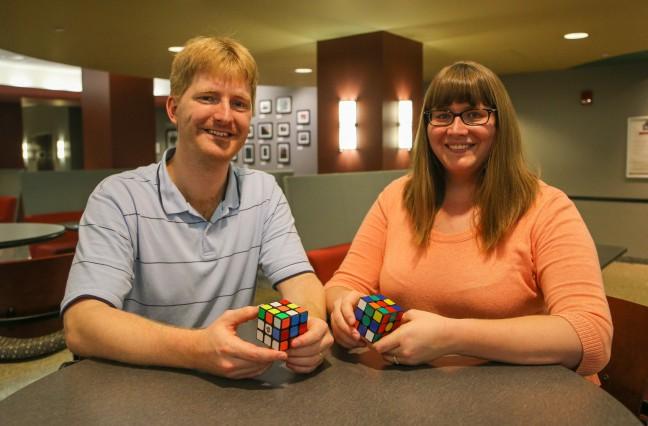University of Wisconsin graduate students Chris and Katie Hardwick’s love story began when she saw him blindfolded, solving a Rubik’s cube.
The two met at a Mensa Convention — an event put on by the world’s largest high IQ society, Mensa International — in Orlando, Florida in 2006. Geographic Information Systems Capstone Certificate Program student Katie Hardwick said Chris Hardwick was delivering a talk on the process of blindfolded Rubik’s cube solving.
After the presentation, the two met and hit it off that weekend while playing board games and talking about “the cube.”
“I heard he was pretty amazing and I made him solve it for me a couple times,” Katie Hardwick said. “Chris got me into it. I asked him how to do it, and he showed me, so that’s how I learned.”
Chris Hardwick, who’s also a student in the Actuarial Science Capstone Certificate Program, was young when he became interested in the Rubik’s cube and how he could maneuver it. Like most people, Chris Hardwick fiddled with it and didn’t get very far. But right before high school, an answer was still elusive, so he looked up a solution and was “hooked” from that point forward.
While the Rubik’s cube was a popular concept in the 1980s, he said internet culture has played a role in his involvement and the Rubik’s cube’s resurgence. Chris Hardwick said the internet has cultivated a sharing of ideas that allowed him to become immersed in the puzzle.
At a time when “cubers” were just beginning to figure out how to get faster, Chris Hardwick found fast solving easy. He was so fast he began to compete on the international circuit at the Rubik’s Cube World Championship in 2003.
Hardwick was at his peak from the early 2000s through 2011. But now that the world championship is held every two years, he said it’s still a great excuse for Katie Hardwick and him to travel.
“It’s a fun thing, and when Katie and I met, we’ve been going together every two years,” Chris Hardwick said. “It’s a great excuse to see new places, we’ve been to Las Vegas, Brazil and travelled all around the U.S.”
Because cubing is such a “rare” interest, it makes for a close-knit community, Katie Hardwick said.
“It’s really rewarding. But the difficulty is best comparable to when you had no idea how to drive to when you drive now,” Hardwick said. “A lot of people know how to drive but it also takes some time to learn how to do it.”
When it comes to cubing at UW, the Hardwicks hosted a competition on campus in October called “Fewest Moves” where contestants have one hour to solve a cube in the fewest number of turns.
It’s a paper and pencil test, but Katie Hardwick said it would be “really cool” to host a standard contest where competitors are physically maneuvering an actual cube.
While there are winners to the competitions, she said it’s really more of a fun way for people to get together and cube.
“It’s really hard,” Katie Hardwick said. “But every time you solve it it’s just really exciting when you finish like ‘oh my gosh, I just did that. It’s just a lot of fun.”


